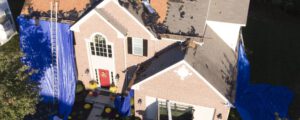How to Manage a Large-Scale Commercial Roofing Project
Large-Scale Commercial Roofing Project
The roof on any commercial property plays a crucial role in protecting the building and its contents. It is a complex, large-scale structure that requires skilled and experienced contractors to install, repair, or replace. The roof on a business, office, school, hospital, or shopping center can be made from a wide variety of materials to suit the needs and budget of the building owner. In addition to the many different roof styles and materials, there are also various types of roof structures that may require specialized installation.
This question is designed to gauge your ability to manage a large-scale project and the different types of resources that are involved in a commercial roofing project. Commercial Roofing projects often involve multiple types of roofing materials, equipment, and manpower that need to be sourced from several vendors. Interviewers want to know if you are able to effectively manage these elements and ensure the project stays on track and within budget.

Thermal and moisture protection are essential for ensuring that the structural integrity of a building is protected. These components work together to reduce energy consumption and prevent water penetration that can lead to mold growth, structural damage, and reduced indoor air quality. Interviewers ask this question to assess your knowledge of the best practices and materials for protecting commercial roofs from moisture and heat.
How to Manage a Large-Scale Commercial Roofing Project
Commercial roofs can be made from a variety of materials, including single-ply membranes (TPO, PVC, EPDM), concrete, built-up roofing system (BUR), and tar and gravel. Each type of roofing material has its own advantages and disadvantages, depending on the specific building and weather conditions. In general, higher-grade roofing materials can offer better long-term performance and durability.
As a professional Barrie Roofing, you should have a thorough understanding of the various types of commercial roofing and how each can be used to meet the specific requirements of a building and its owners. You should also be familiar with the latest advances in roofing technology and be able to advise clients on the best type of roofing for their particular property.
While regular roof maintenance can help prevent commercial roofing problems, the best approach is to catch issues before they turn into serious problems. This is why commercial roofing inspections are so vital, allowing professionals to identify and address minor issues as they arise and extend the lifespan of your roof.
Typically conducted twice a year, during the spring and fall, the inspection process will involve a comprehensive walk-through of the entire roof. The inspector will check for general wear and tear, inspect the condition of the shingles or other materials, examine soffits and flashing, and check gutters for blockages and signs of moisture. They will also look for any areas that require more extensive work, including deterioration of expansion joints, seals, and insulation.
Leave a Reply